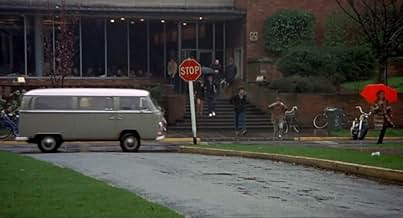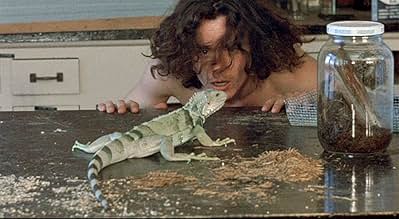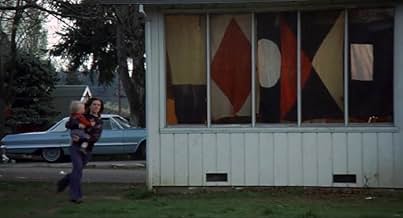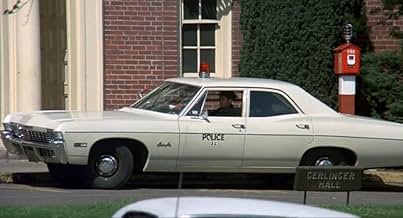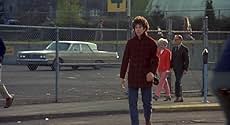IMDb-BEWERTUNG
5,7/10
1860
IHRE BEWERTUNG
Füge eine Handlung in deiner Sprache hinzuThe star player of a college basketball team starts to go off the rails with an illicit love affair and his roommate going crazy to avoid the war draft.The star player of a college basketball team starts to go off the rails with an illicit love affair and his roommate going crazy to avoid the war draft.The star player of a college basketball team starts to go off the rails with an illicit love affair and his roommate going crazy to avoid the war draft.
- Auszeichnungen
- 1 Gewinn & 1 Nominierung insgesamt
Michael Warren
- Easly
- (as Mike Warren)
Lynette Bernay
- Dance Instructor
- (as Lynn Bernay)
Joseph Walsh
- Announcer #1
- (as Joey Walsh)
David Ogden Stiers
- Pro Owner
- (as David Stiers)
Mireille Machu
- Secretary
- (as I.J. Jefferson)
Empfohlene Bewertungen
Drive, He Said (1971)
** (out of 4)
Jack Nicholson's directorial debut is a confussing mess but here goes. The film deals with a troubled basketball star (William Tepper) who's caught in an affair with a teacher's wife (Karen Black). The only person trying to make him go straight is his coach (Bruce Dern) but outsiders keep stepping in the way. The film was also co-written by Nicholson and most of the blame can start right here. The film is all over the place and it seems there are enough story lines for at least five other movies. There's also a subplot with a friend who's trying to dodge the draft, which goes no where and leads to some pretty over the top, wannabe serious moments. The one thing going for the film are some pretty good performances, although it appears Dern is trying to give a Nicholson impersonation. Nicholson's direction hits a few good notes but in the end this seems like something that would have only been shown on TV. Needless to say it's never gotten an official release on home video.
** (out of 4)
Jack Nicholson's directorial debut is a confussing mess but here goes. The film deals with a troubled basketball star (William Tepper) who's caught in an affair with a teacher's wife (Karen Black). The only person trying to make him go straight is his coach (Bruce Dern) but outsiders keep stepping in the way. The film was also co-written by Nicholson and most of the blame can start right here. The film is all over the place and it seems there are enough story lines for at least five other movies. There's also a subplot with a friend who's trying to dodge the draft, which goes no where and leads to some pretty over the top, wannabe serious moments. The one thing going for the film are some pretty good performances, although it appears Dern is trying to give a Nicholson impersonation. Nicholson's direction hits a few good notes but in the end this seems like something that would have only been shown on TV. Needless to say it's never gotten an official release on home video.
One of the more unusual movies I've ever seen is "Drive, He Said." Made in 1971 made by the same production company that made "Easy Rider" and "Five Easy Pieces" that made Jack Nicholson a star a year or two earlier.
This was the first film directed by Jack Nicholson. It's a combination basketball, free love, anti-draft movie that was filmed on the campus of the University of Oregon. It was not well-received at the time, and was somewhat infamous for its male frontal nudity scenes. The basketball skill level seemed very high.
It's basically the story of two friends--one a basketball star and Greek major who's hormones are raging and is undecided about a pro career. The other is a guy taking drugs to try to stay out of the draft, and basically he flips out.
I thought it was an interesting premise, but I found the speech of the main characters to be stilted. In some ways it captured the ethos of U. S. campuses in the Vietnam War era pretty well.
This was the first film directed by Jack Nicholson. It's a combination basketball, free love, anti-draft movie that was filmed on the campus of the University of Oregon. It was not well-received at the time, and was somewhat infamous for its male frontal nudity scenes. The basketball skill level seemed very high.
It's basically the story of two friends--one a basketball star and Greek major who's hormones are raging and is undecided about a pro career. The other is a guy taking drugs to try to stay out of the draft, and basically he flips out.
I thought it was an interesting premise, but I found the speech of the main characters to be stilted. In some ways it captured the ethos of U. S. campuses in the Vietnam War era pretty well.
I attended college in the late Sixties, and I wanted to chime in with Titov and others who says that this is one of only a handful of movies that captures the time as lived experience rather than journalistic cliché. I can think of only three or four others: "Baby, It's You"; "Dog Fight"; and to some extent Milos Forman's first American film, "Taking Off." Not one of these films is available on Netflix. I saw each when it came out. "Taking Off" was revived pretty often for three or four years, so there must have been others who liked it as much as I did. The others I haven't seen since they were first in theaters, so I can'be sure of my present reaction. But for 40 years I've remembered the last line of "Drive, He Said," which says something.
10titov
This may be the only film that actually comes close to capturing on film the essentially uncapturable world of the American college experience of the late 60s-early 70s. Go ahead, name another movie that even approaches this one: "Getting Straight"? "RPM"? These are caricatures. "Return of the Secaucus Seven" has its moments, but that's a retrospective film about (self-obsessed) individuals more than a film about a time and a place depicted *in* that time and place. "Drive, He Said" portrays-- with subtlety and nuance where it should, and a swift kick in the shorts where that's the only appropriate way-- the anti-draft movement, the ambiguity of big-time college sports (especially when there's a war on), the sexual revolution of the period, and the general unreality of the day. Believe me, it was like that.
The whole cast deserves commendation (as does the director, of course) but particular praise should be reserved for Bruce Dern, as the basketball coach, and Karen Black, the hero's very unusual-- except for that time-- love interest. William Tepper, as the lead, also rates a real round of applause both for his perfect capturing of the student-athlete of the period and for actually playing real college basketball in the film (remember Anthony Perkins in "Tall Story"? Yikes!).
All in all, a classic of a kind-- and the last film someone currently in 6th grade should be writing comments on ("boring", "repellent"-- um, right, sonny, please go back to your Arnold movies). Why isn't this film available from imdb?
The whole cast deserves commendation (as does the director, of course) but particular praise should be reserved for Bruce Dern, as the basketball coach, and Karen Black, the hero's very unusual-- except for that time-- love interest. William Tepper, as the lead, also rates a real round of applause both for his perfect capturing of the student-athlete of the period and for actually playing real college basketball in the film (remember Anthony Perkins in "Tall Story"? Yikes!).
All in all, a classic of a kind-- and the last film someone currently in 6th grade should be writing comments on ("boring", "repellent"-- um, right, sonny, please go back to your Arnold movies). Why isn't this film available from imdb?
This was a very interesting movie, as it was Jack Nicholson's directorial debut, and included several other stars before they "became big" such as Bruce Dern and Karen Black. I was an extra in this movie when filmed on the University of Oregon campus/in Eugene area in 1971. Before it came out in theaters, I had left the country for the Peace Corps. When I returned, it had come and gone but I never got a chance to see it.
I remember one of the scenes was filmed with a camera inside a basket ball, and was passed back and forth across the court running from one end to the other to "get a perspective from the ball's viewpoint".
Anyone seen any copies (vhs or other options for getting a copy)? Would love to see it, as I was in several scenes but again never saw it.
Thanks for any leads or ideas of where one would go to get more info.
Bob Petow (bobpetow@comcast.net)
I remember one of the scenes was filmed with a camera inside a basket ball, and was passed back and forth across the court running from one end to the other to "get a perspective from the ball's viewpoint".
Anyone seen any copies (vhs or other options for getting a copy)? Would love to see it, as I was in several scenes but again never saw it.
Thanks for any leads or ideas of where one would go to get more info.
Bob Petow (bobpetow@comcast.net)
Wusstest du schon
- WissenswertesJack Nicholson's solo directorial debut. It was one of two post-Easy Rider (1969) Nicholson films that weren't released on any kind of home video until 2010. That year, the Criterion Collection released this movie and Ein Zauberer an meiner Seite (1971) on DVD and Blu-ray as part of their "America Lost And Found - The BBS Story" box set.
- PatzerDuring the second basketball game, the writing on the Ohio Leopards jerseys frequently changes from "Leopards" to "Ohio" on a shot by shot basis.
- Crazy CreditsThe opening credits are typed so small, one can hardly read them. Sometimes the letters in the names are blurred because of their ultra-small size.
- VerbindungenFeatured in Skin: A History of Nudity in the Movies (2020)
Top-Auswahl
Melde dich zum Bewerten an und greife auf die Watchlist für personalisierte Empfehlungen zu.
- How long is Drive, He Said?Powered by Alexa
Details
Box Office
- Budget
- 800.000 $ (geschätzt)
Zu dieser Seite beitragen
Bearbeitung vorschlagen oder fehlenden Inhalt hinzufügen


